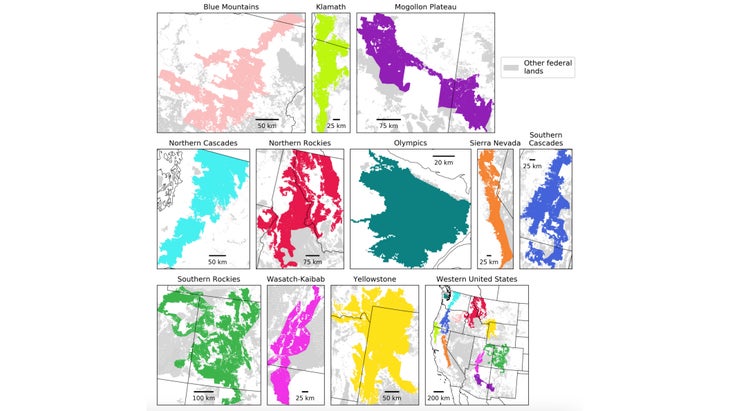|
"],"renderIntial":true,"wordCount":350}'>
A new paper written by 20 wildlife biologists and ecologists and published in the journal BioScience this month offers a simple, cost-effective solution to many of the problems plaguing the West: climate change, a loss of biodiversity, and even mega-fires. The authors suggest we replace livestock grazing across large swaths of federal public lands with protected habitat for two controversial and seemingly unrelated species—wolves and beavers.
Dubbed the Western Rewilding Network, the plan is remarkable in both its simplicity and the studied effectiveness of its proposed solution. Cows produce greenhouse gases and harm ecosystems. Grazing them on public lands doesn’t offer much economic benefit to anyone outside of a handful of ranchers. Wolves and beavers restore those ecosystems to health from top to bottom, altering the presence, behavior, and overall well-being of plants and animals—without much input from or cost to humans.
The authors put the Rewilding Network proposal together in response to President Biden’s call to conserve 30 percent of American lands and waters by 2030. “This is the best possible science on how to do that,” says the study’s lead author, William J. Ripple, a professor of ecology at Oregon State University.
Reintroducing the two species, and protecting habitat for them across 11 major reserves (pictured, top) in Washington, Oregon, California, Idaho, Montana, Wyoming, Utah, Nevada, Colorado, Arizona, and New Mexico, would return streams to their natural courses, repair riparian habitats, and restore fish populations. It would also address overpopulation and overconcentration of ungulates, like deer and elk, while making those species more resistant to disease, improving access to clean water, reducing the severity of wildfires, and helping to restore forests’ ability to capture atmospheric carbon.
What about the cows? The paper proposes removing them from only 29 percent of current grazing areas on public lands in the West. But there’s no need to worry about hamburger supply. The Rewilding Network authors cite a 2008 study that found that cattle grazing across all public lands only accounted for two percent of beef production nationally. The authors propose buying ranchers out of their grazing allotments with “an economically and socially just federal compensation program,” but don’t specify a price. Instead, they write, “the net economic benefits would be substantial given the social carbon cost of livestock grazing on federal lands.”
There’s just one problem: politics. The authors nod to this briefly: “Although our proposal may at first blush appear controversial or even quixotic,” they write, “we believe that ultra ambitious action is required.”
They cite the converging crisis of “extended drought and water scarcity, extreme heat waves, massive fires triggered at least partly by climate change, and biodiversity loss” as being indicative of a need for urgent adoption of the plan. They don’t, however, acknowledge the political reality that many Republican politicians don’t even agree that climate change is real and are actively trying to dismantle the Endangered Species Act.
 Rough outlines for each of the proposed wolf and beaver reserves. Rough outlines for each of the proposed wolf and beaver reserves.
The Republican Party controls all branches of state government in Idaho, Utah, Arizona, Montana, and Wyoming—about half of the states in the Rewilding Network. The paper says that “successful rewilding will depend on the reversal of state policies that severely limit wolf and beaver abundances.” But this would require more than a simple policy change. Rather, it would depend on a fundamental shift in the right’s belief systems, dogma, and relationship with voters.
The Republican politicians who run Idaho, Montana, and Utah have been conducting a war on wolves in recent decades. Montana’s governor received a warning from the state s fish and wildlife department in 2021 after trapping a wolf without the required permits, and signed an order dramatically expanding wolf hunting right up to the border with Yellowstone National Park. Idaho legislators signed a new law last year that is aimed at reducing the state’s wolf population by 90 percent. The law is riddled with lies. Across the West, Republican politicians have successfully turned wolves into a culture war issue in which the species and its defenders are cast as monsters trying to destroy the livelihoods of Republican voters. Beavers are less scary than wolves, but frequently run into conflict with homeowners.
“We’re just scientists trying to put forward the best possible science,” Ripple tells me. He says he hopes that by advancing knowledge of realistic and cost-effective means for addressing the converging natural crisis in the West, he’s giving conservation organizations and policymakers the tools they need to achieve political consensus.
I asked Ripple if the Rewilding Network could produce significant results, even if the plan is only implemented in a single, Democrat-leaning state like California or Colorado. It turns out, that’s exactly his hope. Citing the example of legalized marijuana, Ripple contends that, even if only a single state implements the Rewilding Network plan, it will be so successful that other states would feel significant pressure to do the same.
“Ultimately, the climate disaster is going to make this a necessity everywhere,” he says.
|